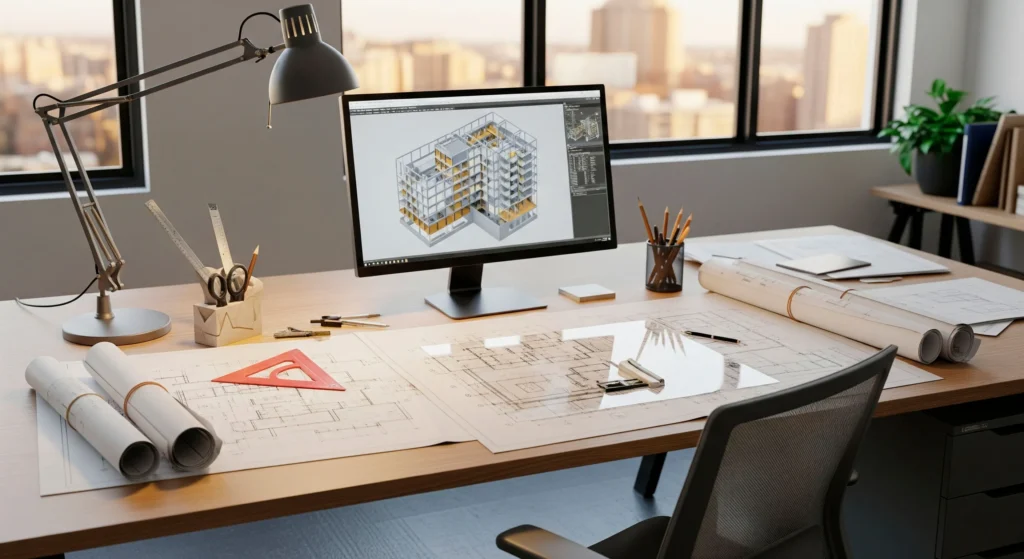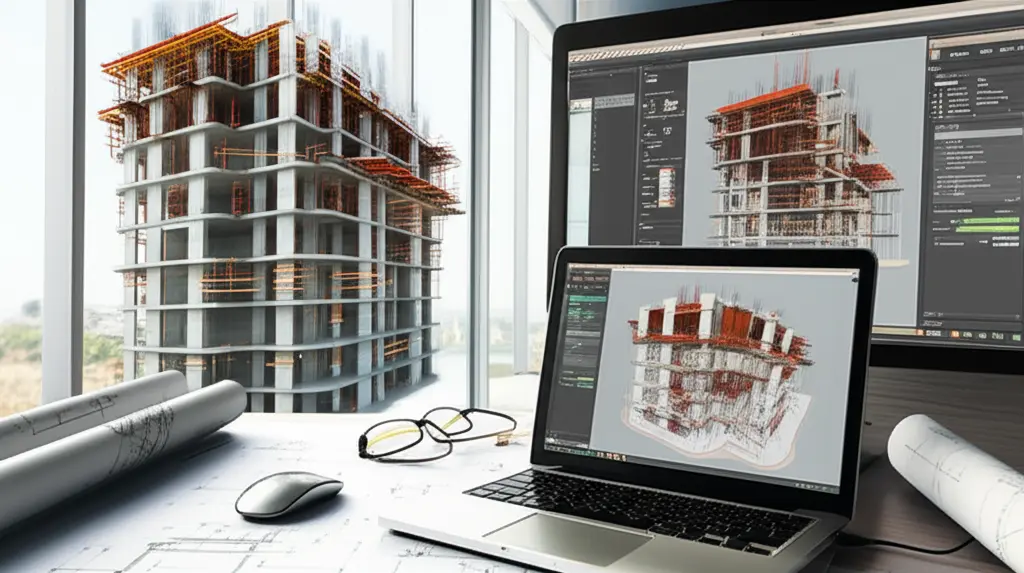AI in Architecture Design
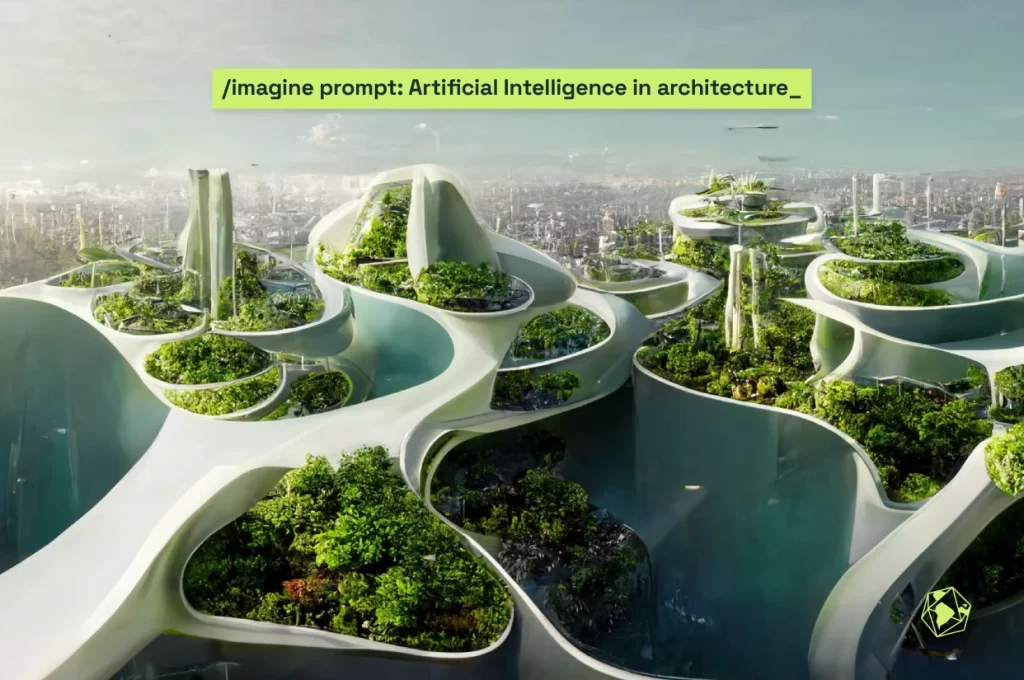
Technology is having a tremendous impact on our industry. Embarking on a journey into Artificial Intelligence (AI) in architecture design, we are running into the tools, technologies, real-world applications, and exciting innovations transforming this field. Along the way, you have two clear paths to follow. A, integrate the resources into your agenda, or B, deny they exist for fear of losing control. Either A or B, there is something very important in-between: time. You may lose it or win it. Maybe you will find your answer at the end of this article on how to use AI in architecture.
In a rapidly evolving world driven by technological advancements, harnessing the potential of Artificial Intelligence (AI) isn’t just an option; it’s a necessity.
The question isn’t whether to adopt AI in architecture but how to use this formidable tool for humanity’s betterment without diminishing architects’ irreplaceable role.
At WorldTeams, our central focus has always been preserving and enhancing human values and talents. That’s why we embrace AI as a tool, a partner in the creative process, rather than a substitute for architects.
The AI Revolution in Architecture
Tools and Technologies
The arsenal of AI-powered tools and technologies available to architects today is vast and constantly expanding. From advanced modeling and simulation software to machine learning algorithms that optimize designs for energy efficiency and sustainability, these tools empower architects to explore new frontiers.
One notable example is generative design software, which employs AI algorithms to generate multiple design options based on specified criteria. This accelerates the design process and introduces innovative possibilities that might not be immediately apparent to human designers.
Virtual reality (VR) and augmented reality (AR) technologies are also revolutionizing how architects present and visualize their designs.
AI-driven VR allows clients and stakeholders to experience virtual walkthroughs of architectural projects, providing a more immersive understanding of the final product.
Tools for Architecture
Architizer highlights ARCHITEChTURES as the pinnacle of AI-powered tools poised to revolutionize the landscape of residential planning. Tailored meticulously for discerning architects, it is an unparalleled catalyst for streamlining decision-making processes and maximizing overall efficiency.
With ARCHITEChTURES, architects harness the cutting-edge prowess of artificial intelligence to a remarkable extent. This transformative tool examines many factors, including site conditions, climate dynamics, budget constraints, and client aspirations. With this wealth of information, ARCHITEChTURES unveils a spectrum of design possibilities that seamlessly blend form and function, effectively breathing life into architectural visions.
Counted among the most trusted allies of architects, ARCHITEChTURES empowers professionals to transcend limitations and unlock unprecedented efficiency. Automation takes center stage, liberating architects from the monotony of mundane tasks. Moreover, architects gain access to an extensive palette of design parameters, allowing them to establish boundaries and set the program in motion to explore myriad options.
In summary, ARCHITEChTURES is not just an AI tool; it’s a transformative force that empowers architects to push the boundaries of what’s possible in residential planning. Its ability to seamlessly integrate complex data, harness the power of AI-driven automation, and provide a comprehensive suite of design parameters makes it an indispensable companion for architects aiming to elevate their residential projects to new heights of creativity, efficiency, and precision.
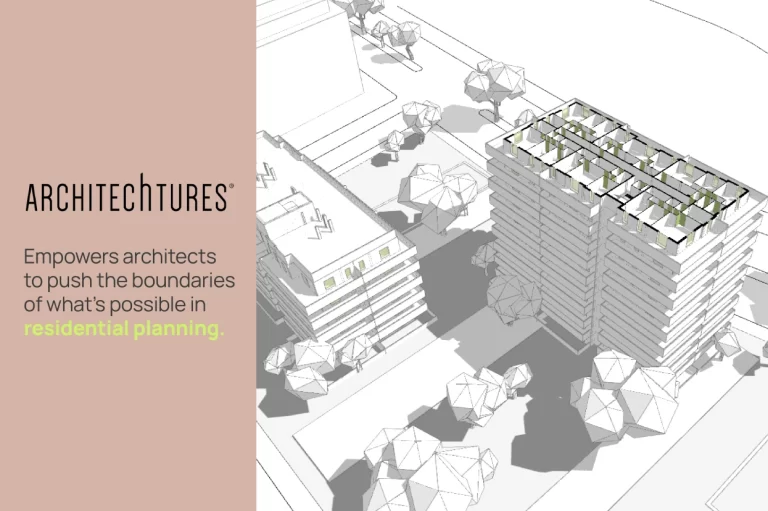
Tools for Schematic Design
ArkDesign.ai emerges as the solution to schematic design packages, delivering immense benefits to architects and developers. This intelligent platform swiftly optimizes building designs, allowing you to make well-informed decisions with remarkable speed.
At the heart of ArkDesign.ai lies a powerful AI engine that meticulously analyzes and comprehends the metadata associated with architectural designs. It effortlessly generates an array of design variations, all while ensuring strict compliance with US local regulations and ordinances. This commitment to compliance ensures that every project shines with innovation and adheres to the highest standards of efficiency, quality, and cost-effectiveness. ArkDesign.ai is your indispensable partner in the journey to architectural excellence and regulatory compliance.
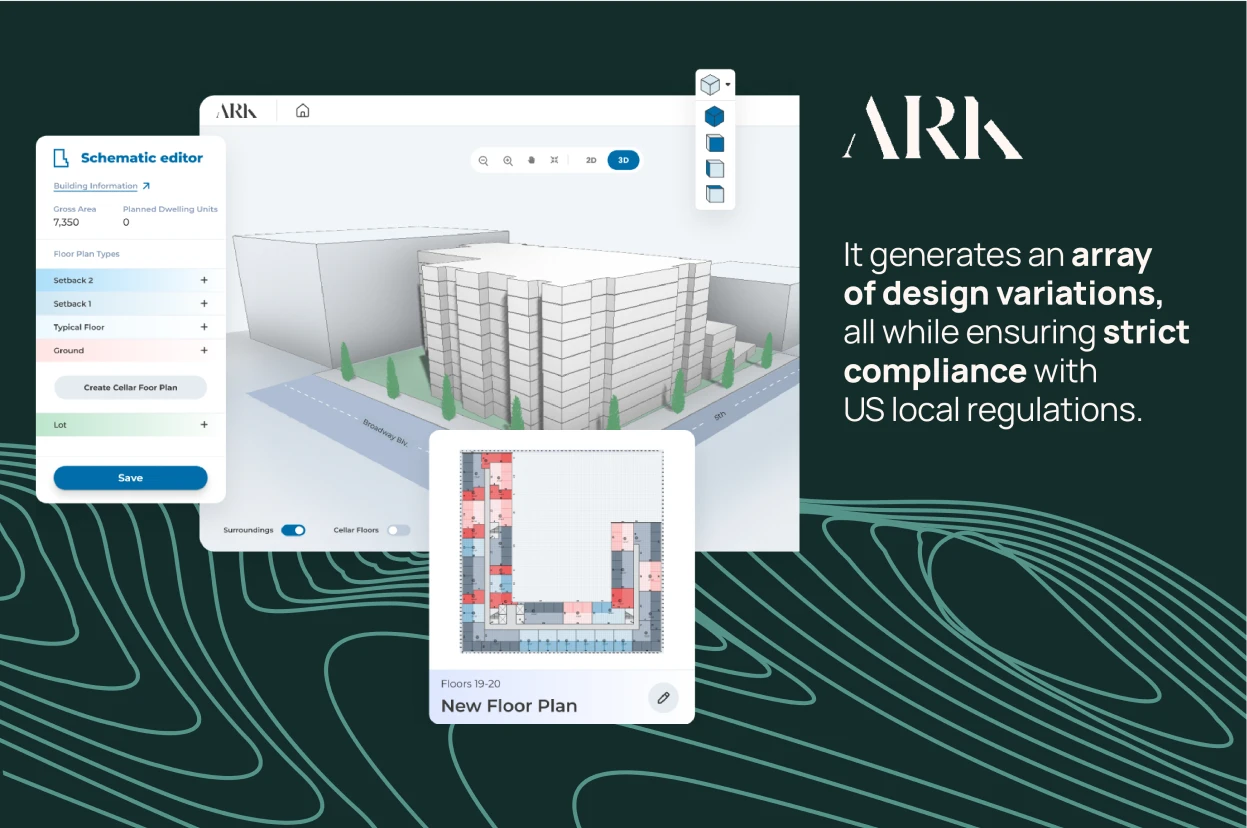
Tools for Rendering
Arko.ai is the new face of architectural rendering powered by cutting-edge AI technology. In minutes, Arko.ai crafts breathtaking, photorealistic renderings that breathe life into your 3D models, all within the convenience of a cloud-based platform.
What sets Arko.ai apart is its ability to redefine the design process for architects. It serves as a dynamic medium that transforms 2D sketches and models into tangible, lifelike renderings, granting architects a vivid preview of their creations in the real world.
Beyond its visual prowess, Arko.ai is time-saving. It takes on the labor-intensive task of rendering, liberating architects to channel their energies into the creative dimensions of their designs.
Compatible with popular software like SketchUp®, Revit®, and Rhinoceros®, Arko.ai emerges as an invaluable addition to every architect’s toolkit, offering realistic visualizations and precious time savings. It’s a leap forward in architectural rendering powered by the AI revolution.
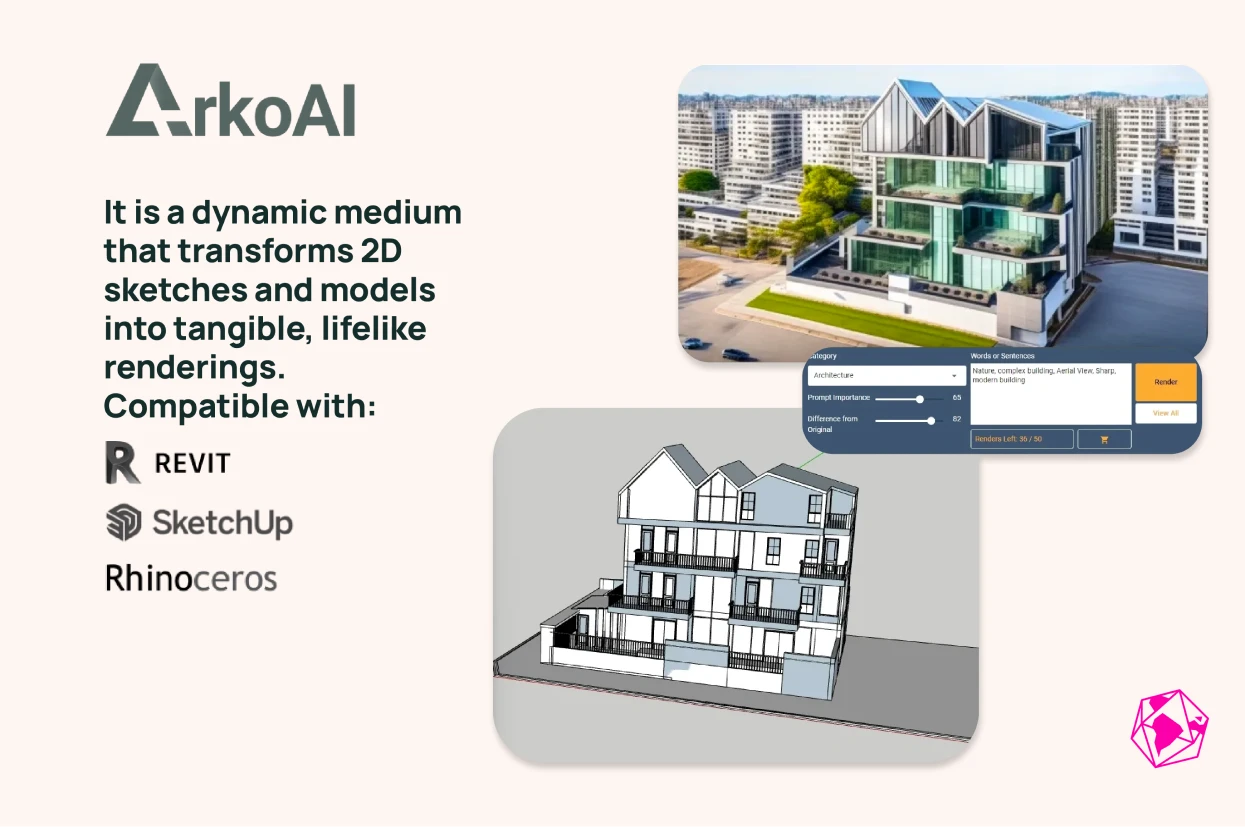
Pre-landing Stage and Project Management Tools
Be in real-time with designs
Architects now have the power to supercharge their schematic design process with software like Maket. Picture this: real-time collaboration with clients, turning what used to take months of planning into a matter of minutes.
Maket taps into an expansive, constantly updated database of designs and building codes, enabling the instant creation of well-designed, code-compliant building models. This groundbreaking capability means architects can sit down with clients anywhere in the country and start building and closing deals during that very first meeting.
Click-Up for PMs
This tool is a groundbreaking task management solution designed to supercharge productivity. Streamlines your workflow by allowing effortless task creation, seamless team member assignments, and comprehensive progress tracking. You can create subtasks, due dates, and comment threads that enhance task management efficiency.
Within ClickUp’s virtual workspace, you can harness real-time collaboration to refine designs collectively. Explore the treasure trove of insights provided by ClickUp’s reporting tools, pinpointing areas for enhancement and refining your workflows. Dive into project panoramas through analytics and visualizations for a comprehensive view of your endeavors.
Building Information Modeling (BIM)
The Building Information Modeling is a process that leverages digital technologies to design, construct, and manage buildings and infrastructure. BIM has become a critical tool for architects, engineers, contractors, and facility managers to collaborate on the design and construction of a building project. Why? Because it keeps errors down, minimizes waste, and makes the construction process flow more smoothly. This can result in better project outcomes and reduced overall costs.
How to Implement the Tools: Cases and Innovations
The application of AI in architecture spans a wide spectrum of use cases, each with its own set of innovations:
1. Generative Design
Generative design is at the forefront of AI innovation in architecture. By leveraging AI algorithms, architects can input design parameters and constraints and let the software generate many design options. These options are evaluated based on various criteria, such as aesthetics, structural integrity, and sustainability, allowing architects to make informed decisions quickly.
2. Energy Efficiency
Sustainability is a paramount concern in contemporary architecture. AI can analyze building designs to optimize energy usage, suggesting modifications that enhance efficiency. For instance, AI can determine the ideal placement of windows, insulation materials, and renewable energy sources to reduce a building’s environmental impact.
3. Site Analysis
AI algorithms can process large datasets to analyze potential building sites. Factors like topography, climate, and infrastructure can be assessed to determine the suitability of a location for a specific architectural project. This data-driven approach ensures that architects make informed decisions regarding site selection.
4. Collaboration and Communication
Real-time collaboration is essential in modern architecture. AI-supported platforms enable architects, engineers, and stakeholders to collaborate seamlessly across geographical boundaries. Virtual reality (VR) and augmented reality (AR) technologies facilitate immersive, remote project reviews and design consultations.
Grow your team and reduce costs with WorldTeams.

Will AI Replace Architects?
A fundamental question when discussing AI in architecture is whether it will eventually replace real architects. The answer, however, is not a straightforward ‘yes’ or ‘no.’ AI can automate routine tasks, streamline aspects of the design process, and enhance decision-making. Still, it cannot replicate the creative intuition, ingenuity, and human touch that architects bring to their projects.
AI is a complementary tool, augmenting architects’ capabilities and opening up new horizons. It allows architects to focus on conceptualization, innovation, and the human-centric aspects of design while offloading repetitive and time-consuming tasks to AI-driven software.
The role of architects is evolving in tandem with AI’s integration into the field. Architects are becoming orchestrators of creativity, utilizing AI as an assistant rather than a replacement. The synergy between human architects and AI leads to groundbreaking architectural achievements that were previously unattainable.
Architectural Ethos: AI for Good
Ethical considerations are paramount in a world where AI’s capabilities are expanding rapidly. AI should not be employed indiscriminately; rather, it should be harnessed for the greater good of society.
At WorldTeams, the mission is clear: to utilize AI as a force for good, enhance the architectural profession, and deliver innovative solutions that address global challenges. The focus extends beyond mere efficiency and productivity; it encompasses sustainability, accessibility, and the well-being of communities.
AI in architecture isn’t about replacing architects; it’s about empowering them to create more intelligently, efficiently, and sustainably. The ultimate aim is to craft a better tomorrow where AI and architecture collaborate to shape a brighter, more humane, and more powerful future.
The Future of AI in Architecture
As AI continues to evolve, its role in architecture will expand. Architects will increasingly leverage AI to design environmentally responsible, aesthetically stunning, and functional spaces. AI-driven innovations will enable architects to push boundaries and explore novel architectural forms that were previously unattainable.
Moreover, the integration of AI will contribute to the democratization of architecture. It will enable more accessible design tools and affordable housing solutions, addressing societal challenges such as housing shortages and urbanization.
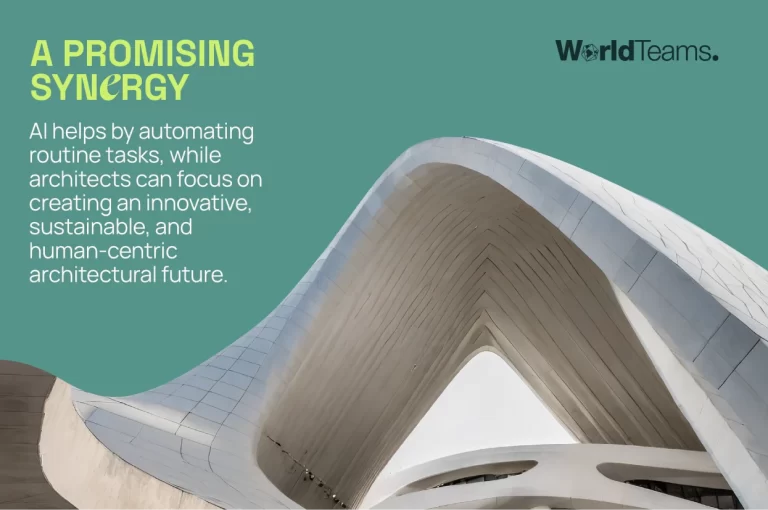
Last but not least (AI won’t say this)
In conclusion, the fusion of architecture and AI represents a promising synergy. The architecture AI revolution is not about replacing human architects but empowering them to transcend traditional boundaries, explore new creative horizons, and design with greater precision, efficiency, and sustainability.
The advantages become evident as one delves into the realm of AI in architecture. AI tools, such as advanced modeling and simulation software, can save architects significant time in the design and planning stages. This newfound time can be a precious resource, allowing architects to redirect their focus toward more personal and meaningful connections with colleagues and clients. By automating routine tasks and offering insights, AI empowers architects to be more present and engaged in their professional relationships.
At WorldTeams, the commitment to using generative artificial intelligence in building architecture for the betterment of humanity remains unwavering. The focus is channeling technological progress toward a brighter, more humane, and powerful architectural future. It’s a future where architects are elevated, not replaced, by AI and where innovative, sustainable, and human-centric designs flourish.
Which tool will you start trying today?
The sooner, the better!
Contact us today for more information!







